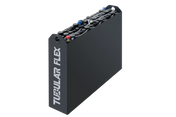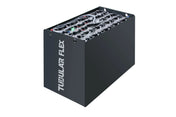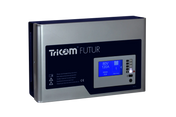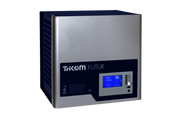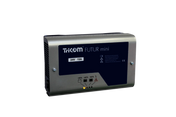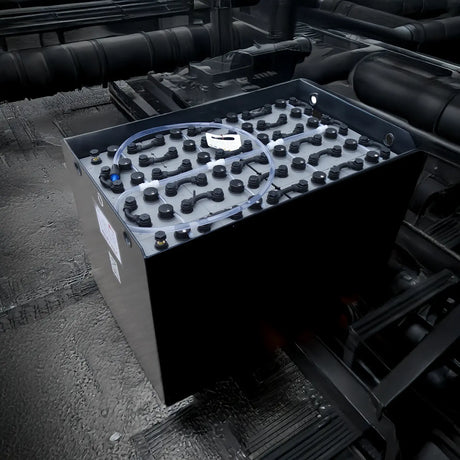Forklift batteries are the heart of every electric forklift. They determine performance, service life, and operating efficiency. Many companies face the question: should they buy new or opt for used batteries? Thanks to modern testing procedures, used forklift batteries are now a viable alternative with compelling advantages.
This guide shows typical applications and explains why used batteries are often the smarter choice.
Why used forklift batteries are a real option
Used batteries are thoroughly tested before sale. Only models with high residual capacity are returned to the market. In many cases, the available capacity is between 60 and 100 percent . This makes them technically almost equivalent to new batteries for many applications.
Cost advantage with calculable performance
The biggest difference is the price: Used forklift batteries are on average 30 to 50 percent cheaper . Documented test reports provide transparent evidence of their performance. Companies thus receive a reliable battery with significant savings potential—a crucial factor in times of rising operating costs.
Use in companies with medium utilization
Not every forklift operates in multiple shifts every day. Many companies use their vehicles part-time or seasonally. In these cases, a used battery is ideal, as it provides the necessary power without incurring unnecessary additional costs.
This approach is particularly suitable for smaller warehouses or craft businesses.
Cover seasonal peaks flexibly
Retail or agricultural businesses often experience highly fluctuating operating times. Used batteries can be used to economically offset these peaks. Instead of investing in expensive new equipment, existing forklifts can be flexibly upgraded with tested used batteries.
Perfect solution for reserve and replacement forklifts
Many companies keep additional equipment on hand to cover downtime. These forklifts rarely run continuously, but must be ready for use at any time. Used forklift batteries are ideal for such scenarios. They ensure functionality while significantly reducing investment costs.
Redundancy without high capital investment
A replacement forklift with a new battery ties up capital that remains unused in everyday operations. A high-quality used battery delivers the same benefits, but at a fraction of the cost. This way, the reserve remains economically viable and ready to go at any time.
Use in education and training
Forklifts used for driver training or internal training are only used for a few hours per week. In this environment, used batteries are a particularly efficient solution . They enable practical training without the need for expensive new purchases.
Long service life with low load
Since training devices rarely operate at full load, used batteries retain stable performance for years. Companies benefit from low costs and high availability of training devices.
Suitable for light transport tasks
Used batteries are also ideal for internal material flow applications involving short distances and light loads. Even models with 70 to 80 percent remaining capacity provide sufficient energy. This allows warehouse or production processes to be handled efficiently without incurring unnecessary costs.
Example: Logistics in production halls
In many manufacturing plants, forklifts only perform short transports between workstations. Full high-performance capacity isn't required here. A tested used battery reliably covers these applications and extends the lifespan of the fleet.
Sustainability as an additional advantage
The use of used forklift batteries makes an active contribution to environmental protection. Every reused battery saves raw materials and reduces the energy consumption that would otherwise be generated by new production. Companies that choose used batteries combine cost efficiency with ecological responsibility .
Positive external impact through resource conservation
Sustainability is also a competitive advantage today. Those who use used batteries demonstrate a sense of responsibility toward customers, partners, and employees. This creates an additional image boost that goes beyond pure cost advantages.
Which forklift battery is suitable for whom?
| For whom? | New forklift battery | Used forklift battery |
|---|---|---|
| Companies with 2 or 3 shift operations | Recommended because maximum performance and long runtime are required | Rather unsuitable, as high continuous load quickly reduces the residual capacity |
| Smaller companies with occasional forklift use | Usually oversized and unnecessarily expensive | Ideal, as tested quality at lower costs is completely sufficient |
| Reserve or replacement forklift | Costly because the battery remains unused for a long time | Very useful, as it is cheaper and yet ready for use at any time |
| Training and education centers | Not absolutely necessary as usage is low | Optimal because of low load and high cost efficiency |
| Companies with a focus on sustainability | New production puts a strain on resources | Ecologically sensible, as existing batteries can continue to be used |
| Companies with funding opportunities for Li-Ion | Worthwhile, as subsidies cushion the investment | Used lead-acid batteries are often cheaper, but less eligible for subsidies |
Conclusion: Used forklift batteries as a smart choice
Whether for backup equipment, training, seasonal use, or everyday transport – used forklift batteries are a virtually viable alternative to new purchases. They impress with their proven quality, high residual capacity, significant cost advantages, and sustainable impact. Companies that rely on used batteries secure a cost-effective, flexible, and environmentally friendly solution for their fleet.


